In just three months, 2024 will end. If the economy behaves in a similar way to how it behaved in the first half of the year, it will be very difficult for the announced growth target — (2%) later revised downwards by ECLAC (1.3%) — to be achieved.
It is worth emphasizing that an average growth rate for this period (2019-2024) such as the one we may have (-2%) condemns the citizens of Cuba to not seeing their income doubled in the next 150 years. Of course, those citizens will be other, probably our great-great-grandchildren.
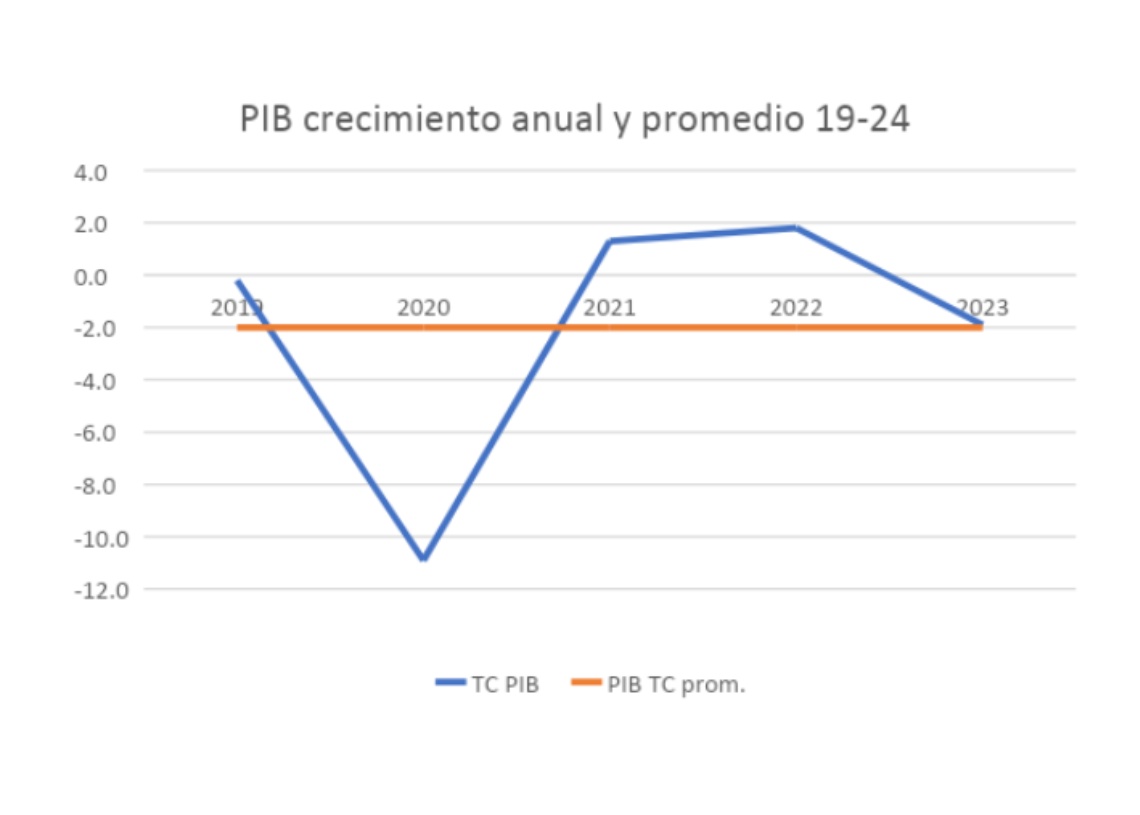
In 2023, GDP performance in the fourth quarter was -4.7% compared to 2022. The areas that make up the productive sector — agriculture, fishing, mines and quarries, sugar industry and manufacturing — all had negative performances compared to the previous year. If these negative indicators continue in 2024, the fourth quarter of the year will reinforce the downward trend of the national economy.
The other component of the aggregate supply, imports, were 58% of the plan and decreased by 22% compared to the same period in 2023. If the behavior is repeated in the second half of the year, something foreseeable given the new regulations for the private sector — which has contributed significantly to the food supply —, a rebound in inflationary dynamics could be expected due to the reduction in supply; especially of food products in the country.
The data corresponding to investment in the first half confirm the difficulties in finding a robust growth path.
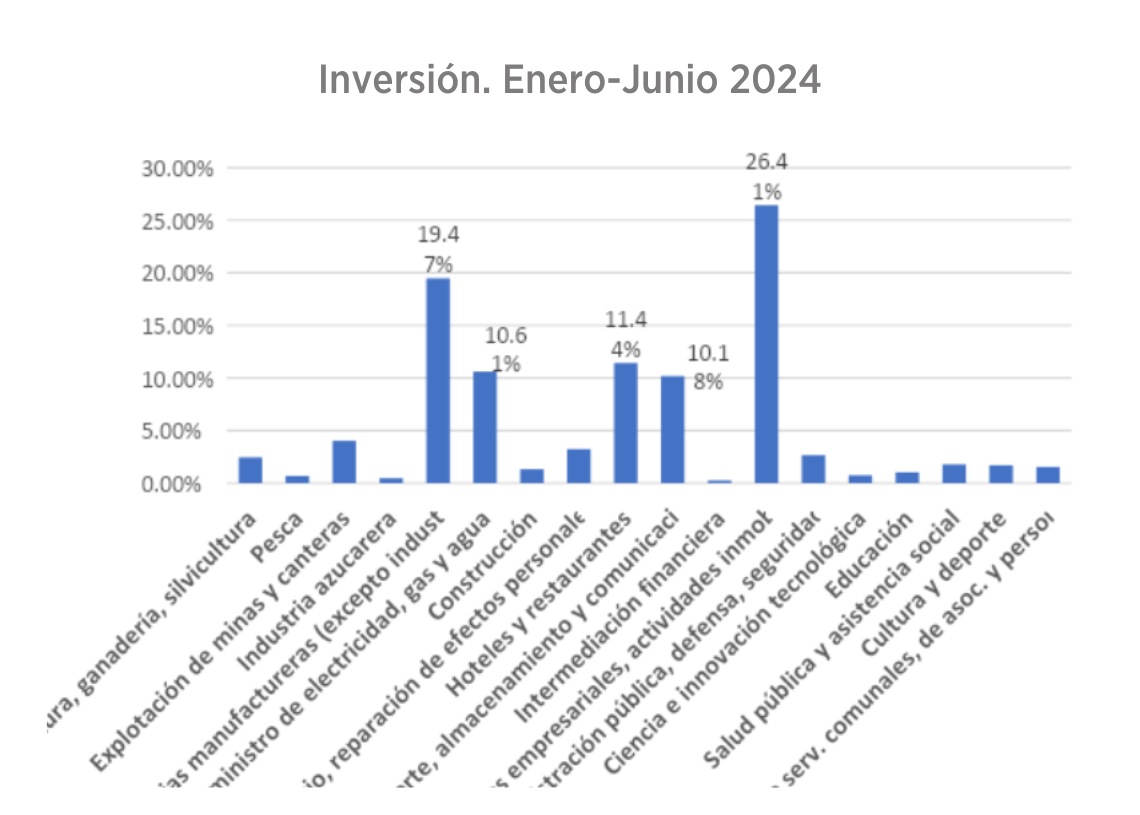
Investment executed in the first half of the year continues to be concentrated in the real estate sector and in hotels and restaurants, which together account for 38% of total investment.
A positive aspect is the participation of the non-sugar manufacturing sector, which reached almost 20%.
Likewise, the participation of the infrastructure sector (energy, gas, water) speaks of the effort made to reduce the impact on both electricity and hydraulic resources, even though the facts show that these investment volumes are insufficient.
However, the agricultural and fishing sectors, of strategic importance to address the food deficit, continue to have a low participation. Likewise, the participation of the sugar sector in the investment executed indicates that it will not be possible to expect its recovery in the medium term.
Strategic sectors for the development of the country — science and technology, education and health — continue to have a low participation in the investment executed, which explains, to a certain extent, the deterioration of the quality of these services in the case of education and health.
The other important reading of the executed investment is in its distribution by province:
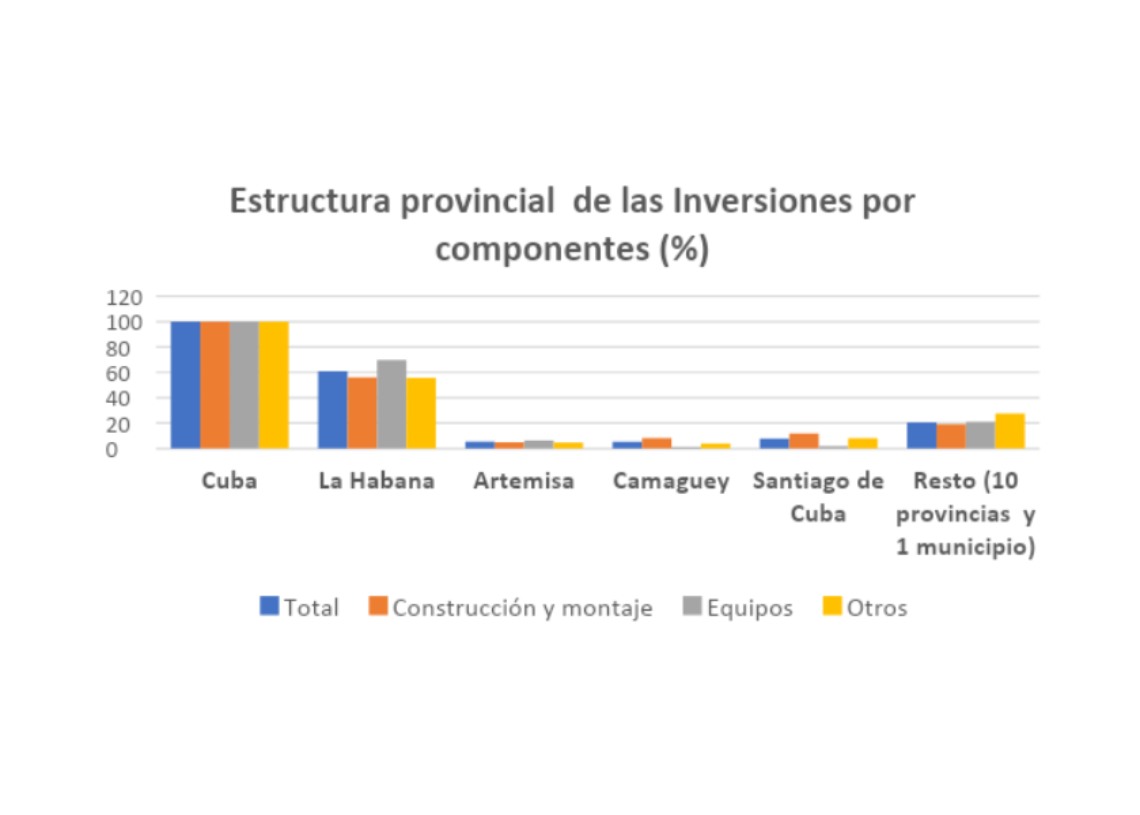
As can be seen, Havana concentrates 60.9% of all investment; Artemisa, Camagüey and Santiago de Cuba 18.5%. Meanwhile, ten provinces and the special municipality of Isla de la Juventud share the remaining 20.6%.
This is especially significant seen from the perspective of the intention to empower the country’s provinces as part of the development strategy. Without investment, it is very difficult to grow, reduce territorial inequalities and improve decisive aspects for the well-being of the population of those territories, such as employment and salaries.
The negative context
The international context continues to generate high uncertainty. The Russian-Ukrainian conflict does not seem to have a quick peaceful solution. “Total war” in the Middle East is increasingly likely. In Latin America, cracks have appeared among progressive governments, and in the United States the race for the presidency does not seem to be defined and, as on other occasions, Cuba does not seem to have relevance for any of the contenders.
In such a global context, we have an economy blocked by the world’s greatest power, with a negative average growth rate, highly indebted, with a fiscal deficit that will reach 15% of GDP, inflation of 32% in the first six months of the year; with a weakened external sector that exhibits negative values in its current account…. It is very difficult to access international credits or expect significant flows of foreign investment.
The “aid” from some friendly countries may be a momentary palliative, but it cannot guarantee the sustainability of any effort towards development.
In such a situation, one would expect a program that would combine the reduction of imbalances, specifically the reduction of expenses and transfers to the state business sector, and the resizing of the state apparatus, both non-business and business entities.
It would also be worth considering the growth and diversification of the productive fabric through a policy of productive promotion, the expansion of the tax base and greater facilities for national and foreign private investment.
But it is true that a program that contains measures such as those described entails high political risks, due to its possible costs in the social order, strong ideological queries and would require other arrangements that would allow the socialist essence and purpose to be maintained.
Strategies and reality
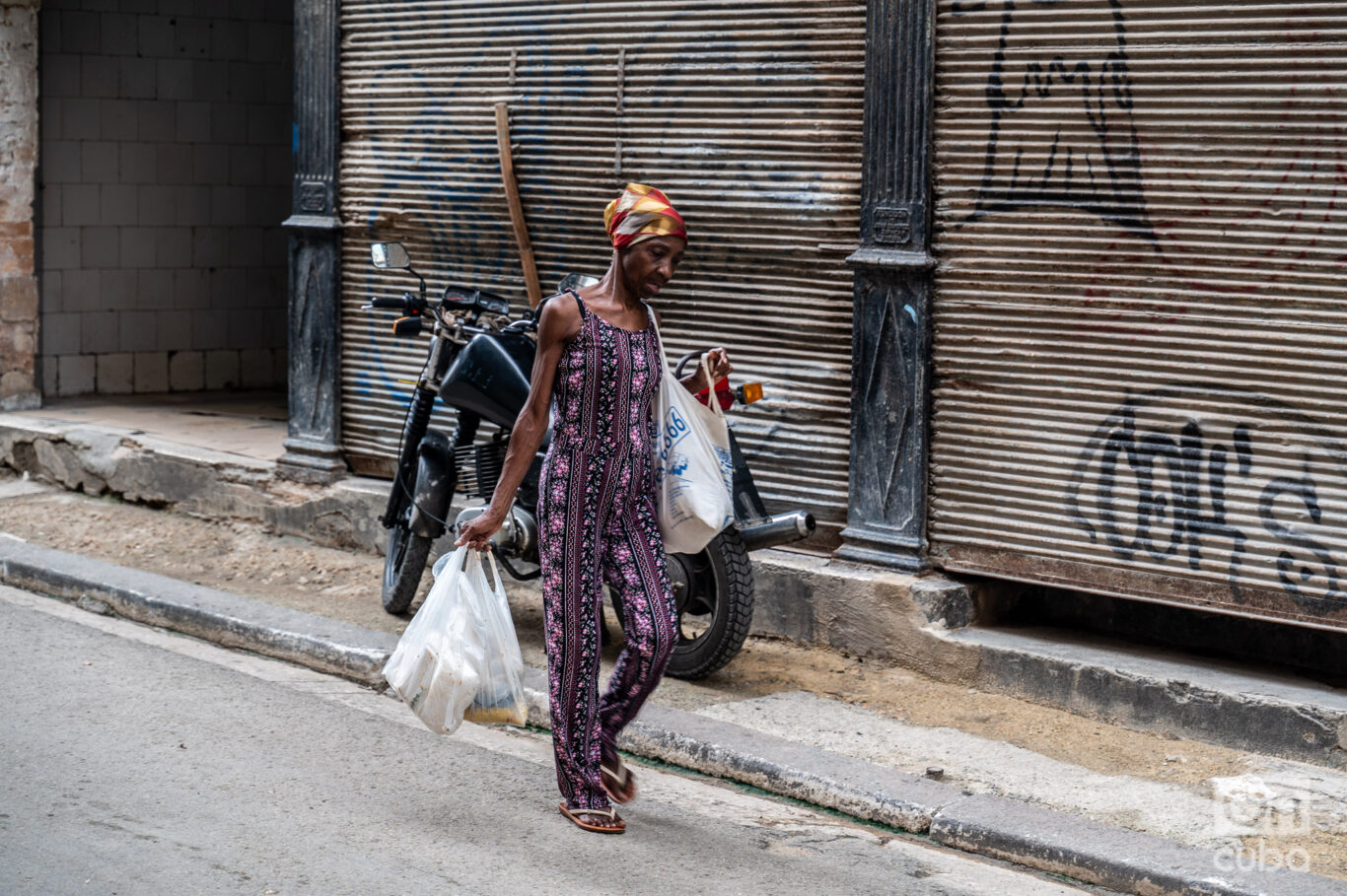
A group of ideas, called strategies, were announced at the National Assembly session last July, on which the main effort would be concentrated:
- Advance government projections with priority on the macroeconomic stabilization program
The program has yet to be made public. Today it is possible to verify an indisputable emphasis on acting more on distortions and illegalities, something necessary, but with a questionable impact on the country’s aspiration/need for growth.
- Boost productive activity, food production and the use of productive capacities
The data made public in the report of the Ministry of Economy on the performance of the agricultural sector during the first half of the year seem to confirm that this idea/strategy will not be achieved. In fact, the accumulated deficits and the weak allocation of investments to the sector speak in the opposite direction.
The hundreds of measures approved for the agricultural sector three years ago have not led to different results. Compared to 2023, the primary sector only reaches 57% of 2019, the secondary sector 79% and the tertiary sector 95%.
And how to boost productive activity and food production if investments are directed to other sectors?
- Contain current expenditure and postpone unnecessary investments
This is undoubtedly essential if manageable and sustainable balances need to be achieved over time. It must be an effort that finds compensatory levers. For this year, the fiscal deficit has been adjusted downwards and is planned to be 15% of GDP; however, it will be 16% higher than in 2023, while fiscal expenditure will be 38% higher than that of the same year.
The good news is that tax revenues have been increased thanks to the increase in financial discipline; at the same time, expenditure has been lower, mainly due to the non-execution of planned activities. All of this has allowed for a deficit of 32.125 billion pesos, which is 23.249 billion pesos lower than planned.
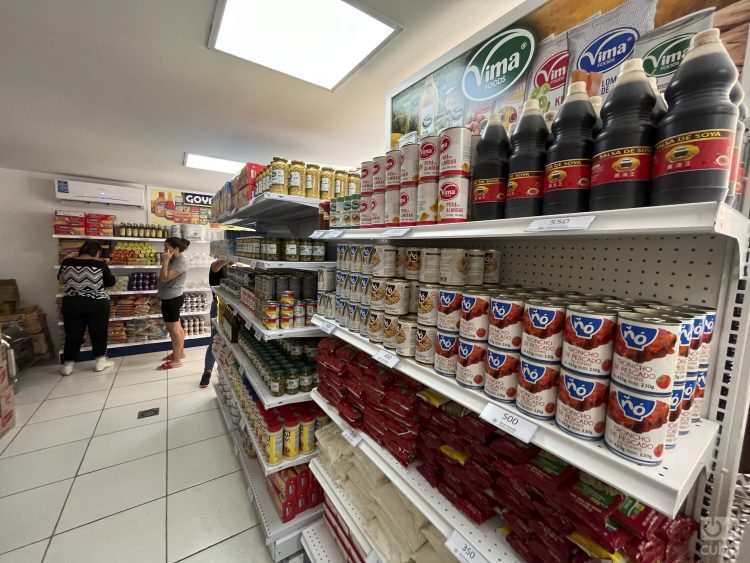
- Sustainability of the National Electric Energy System and promoting the participation of renewable sources
Without energy there is neither sustainability, nor growth, nor development. The deterioration of thermoelectric plants and of what were once support systems — distributed generation — and the lack of fuel have led to generation deficits that negatively impact the dynamics of the economy.
The modernization of these sources requires investment volumes that are impossible to achieve in the short term. The alternative of the increasing use of Renewable Energy Sources (RES) is undoubtedly the most reasonable, although it is not a short-term solution.
If we look at the structure of RES generation, we can see that progress is very slow in this last objective, which casts doubt on the goal of at least 24% in 2030.
The use of bioelectric plants attached to power plants seems to encounter a major obstacle in the availability of raw material given the low levels of grinding in the harvest, in addition to those associated with the processes of facilitating business with foreign investment.
- Increase the country’s foreign exchange earnings
There is a long-standing structural problem that has never been resolved: the dependence of exports for imports. An industrial fabric that is not very complementary and regulations that prevent taking advantage of the so-called “export potential” are among some of its causes.
To this we must add the cuts in imports, the rise in the prices of inputs due to the devaluation of the Cuban peso, which makes these imports more expensive, and the obstacles that the blockade itself adds.
Greater openness and freedom of action of the national business system (state, private, joint) should not be delayed any longer if we want to compete in international markets with the rules that these markets impose.
With the possibility of receiving credits from international organizations rejected due to the effects of the blockade, and the possibilities of accessing credit lines from non-governmental sources diminished due to non-payments to creditors, the only thing left to do is to facilitate the entry of greater flows of foreign investment, flows that have so far been insufficient.
- Reconciliation and adjustment of the State Plan and Budget
Achieving the appropriate adjustment of the plan and the budget has always been an aspiration of the country’s leadership efforts. For an economy with a high level of centralization, achieving the adaptation of resources and plan is essential.
- Improving attention to vulnerable people and sectors
It is crucial to achieve tangible progress in this regard. The average salary rose to 4,648 Cuban pesos in 2023. Eight sectors were below that average, including Education, Public Health, Community Services, Culture, and Agriculture. While it is true that compared to 2019, the average salary in 2023 increased by 529%, between 2020 and 2024 the devaluation of the CUP reached 1,339%, turning those increases into salt and water.
We should add the significant reduction in food through the ration book and inflation, which, although lower than in the same period last year, is still very high compared to the average salary in the country.
Low pensions are the other factor that generates great inequalities and influences the increase in poverty.
- Advance in the process of decentralization of competences
This idea/strategy apparently occupies a decisive place in the implementation of the government program. That the municipalities have the essential competences to efficiently assume such a process depends on multiple factors. The first of them is to have people with the necessary competences, to reduce emigration to other sectors, something difficult if we look at the salary differences between the public and business sectors, whether state or private.
Another factor is the insufficient provision of resources/means to carry out the activity and the volume of needs accumulated in these last five years, increased by the effects of the pandemic.
Drawing up development strategies that truly respond to the needs of the municipalities and that are built in a participatory manner, the accountability on the use of the municipal budget and especially on the percentages corresponding to local development, are complex issues and all are subject to the pressure of a context that is not at all favorable.
- Fighting indiscipline, illegality and manifestations of corruption
It is not possible — and even less desirable — for the dynamics of an economy to be sustained by the existence of indiscipline, illegality and corruption. It would take many pages to deal with these issues. Although they are related, each of these scourges has its own characteristics and its own history.
Discipline is a plant that we stopped cultivating a long time ago and whose main caretakers, the family and the schools, the neighborhood and the neighbors have seen how, helplessly, its opposite, indiscipline, grows and branches out. The causes that feed this weed are so many and varied that they would rush against each other. We all commit them and we accept them as normal behavior. From the half-naked drunk who drinks in front of children in a dirty park full of rubbish in front of the passivity of the police, to those who flout order in a queue. Civility seems to be a medicine that is perpetually lacking.
Illegalities have multiplied, also of all kinds; among other reasons, because we have an overabundance of laws and decrees and because the culture that everything that is not explicitly permitted is illegal still persists, and also because our knowledge of our own laws and our constitutional rights is scarce.
One could write about corruption until exhaustion. There seems to be a high and stable correlation between the creation of more “control” systems and entities and corruption. It has spread faster than COVID-19. It is not that it did not exist before the MSMEs and the expansion of the private sector, but it has undoubtedly gained in depth and extension. There apparently was and is a breeding ground that allows for rapid reproduction of the virus. My professor and colleague Esteban Morales, at the time, warned about it and paid dearly for having anticipated it.
There is no doubt that combating manifestations of indiscipline, illegalities and corruption is urgent, but what is decisive is reducing to a minimum the causes that generate them. That is another debate, which covers all areas of our society and all its entities and organizations are waiting.

MSMEs: a disruptive phenomenon for Cuba
They are disruptive because it is a fact that “they break with the established order and the traditional way of managing the economy and enterprises”; because they are not attached to any of the branches of the Christmas tree to which our enterprises are welded; because they question the method of command and control.
Because they do not have to ask permission to do things; because they constantly push/run the limits of institutional design; because they are proof that our businesspeople can be creative and take risks “if they are allowed” and if the rules of the game were focused more on opportunities and growth rather than on excessive and generally ineffective control; because they talk to each other, negotiate with each other without any ministry supervising/impeding/obstructing a new business; because they have been able to speak as equals with national and international suppliers and have been able to get national enterprises up and running and recover products and brands that seemed extinct.
Perhaps because of all this we have today a new regulatory package that has so far generated more uncertainty and confusion than clarity and confidence.
It is enough to look at the number of hours dedicated on television to clarifying “what the new rules mean”; in the number of hours spent by officials of the entities in charge to explain what still seems to be not sufficiently clear: to repeat over and over again that “it is not a war against MSMEs,” even when the perception of the “MSMEs” is different and in several meetings they themselves have given sufficient examples to the contrary.
MSMEs are the most disruptive thing that has occurred in Cuba in the last decade because they also impact the social and political sphere, question “the established” with facts proven in practice, and demonstrate the need for a profound change in our model of economic management and the approach and management of our social problems. Change outlined in the first version of the Conceptualization, discussed by the people and unfortunately mutilated and left to its fate.
It would be necessary to ask if this new regulatory package:
Is consistent with the need for growth?
Is consistent with the purpose of reducing inflation?
Contributes to the growth of the business fabric?
Facilitates the creation of real “productive chains”?
Contributes to the productive transformation of the country?
Helps to promote exports?
Contributes to raising real income?
Helps reduce inequality and poverty?
Responding with arguments to each of these questions would take many more pages. My greatest satisfaction would be if the reality of the coming months gave us enough arguments to answer each of them affirmatively.
We have not had to face any hurricane this year, at least so far; but every day we are in the eye of a very powerful one.










